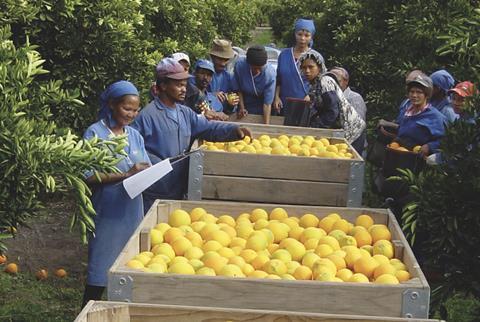The country should expand its citrus markets to counter challenges such as the US trade tariff dispute
While the present impasse between South Africa and the USA on trade tariffs is worrying, there are perhaps other opportunities emerging that will benefit South Africa in future.

“Diversification can minimise risk,” said CGA CEO Boitshoko Ntshabele, confirming that South Africa should, with speed and earnestness, address both tariff and non-tariff barriers to attain wider market access.
He briefed citrus growers on last week’s meetings between South Africa and the US, which covered trade between the two countries.
While there is still little detail of agreements reached at the Washington meeting, it appears that the current situation is already causing major changes in perspectives in the industry.
“China and India have indicated willingness to engage with South Africa,” said Dr Ntshabele. “With a projected increase in production, South Africa needs to retain and grow every market and add some new ones.”
The country’s fruit exporters have recently voiced their concern about ongoing high tariff rates in both India and China – and relief there will be a major boost for the export industries.
Ntshabele said all markets require attention, “whether the current 4 per cent to 6 per cent we export to the US or the current 36 per cent we export to the European Union”.
It appears that the ongoing dispute between South Africa and the EU remains of great concern for South Africa.
“South Africa is in a World Trade Organisation dispute settlement process with the EU regarding their unscientific measures for FCM (false codling moth) and CBS (citrus black spot),” he continued.
“The EU is the top destination for South African citrus, which makes that market particularly important to retain, hence the spend annually by growers to the tune of R3.7bn to ensure compliance with these unnecessary requirements.”
The “onerous” EU requirements are a severe non-tariff barrier that must be addressed, he said, noting it will erode profitability in the long term.
Growers seek market access to ensure that the industry flourishes and meets its growth targets captured in Vision 260.
“This would substantially counter joblessness in many rural communities,” said Ntshabele.
Much of the White House media meeting dealt with crime in South Africa, following the US president Donald Trump’s allegations of white farmer genocide.
“These rural communities also struggle because of unacceptably high levels of crime,” Ntshabele noted. ”Crime affects communities indiscriminately.
”Without safety and security, our farmers and farm workers cannot fully contribute to economic growth and job creation,” he explained.
”Rural crime was again highlighted in the meeting in the Oval Office.
“Hopefully it (the White House meeting) will become a galvanising moment that will lead to improved safety in rural communities,” Ntshabele added.



